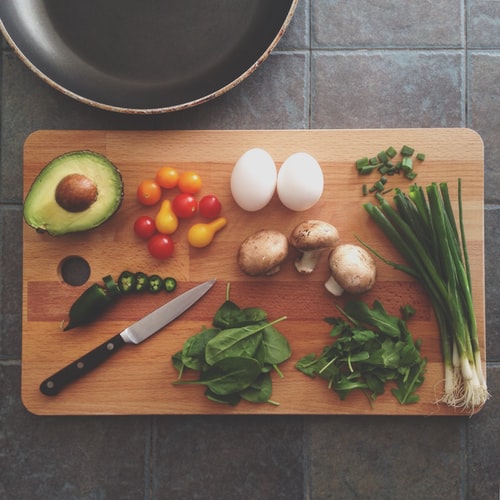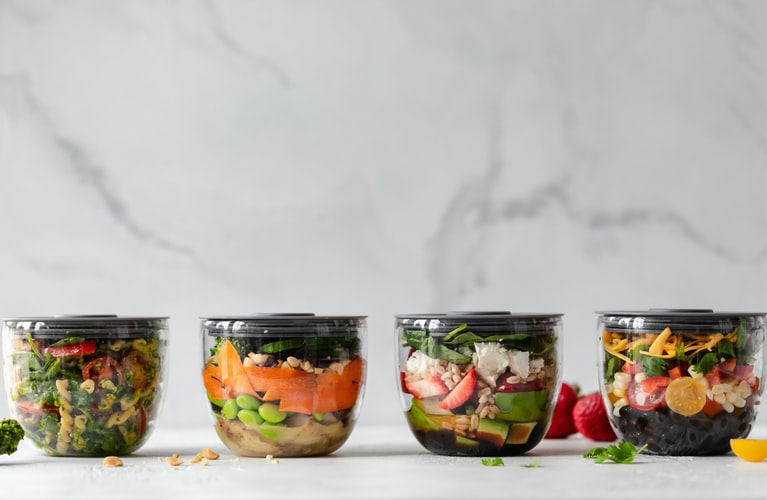Why is Nutrition Important When Losing & Managing Weight?
Eat Better
Why is Nutrition Important When Losing & Managing Weight?

The benefits of good nutrition extend far beyond weight loss. However, it is an essential part of losing weight – and also keeping it off. What constitutes a ‘healthy diet’ will vary person to person. Let’s explore everything you need to know.
What is good nutrition?
Good nutrition means making sure your body gets all the nutrients, minerals and vitamins it needs in order to function at its best1. No single food contains all of the essential nutrients needed for us to stay healthy, which is why a varied, balanced diet is key2.
A healthy diet isn’t just about ensuring we eat the right number of calories for our body. It’s also about making sure we get the wide range of nutrients our bodies need. While consuming less calories than you burn is the fundamental aspect of weight loss, not all calories were made equal, so we need to be consuming the right foods too.
Why is nutrition important?
The benefits of good nutrition extend far beyond weight. It’s a vital part of living healthily, and can help:
- Reduce high blood pressure
- Lower high cholesterol
- Reduce the risk of certain diseases:
- Diabetes
- Heart disease
- Stroke
- Some cancers
- Osteoporosis
- Increase energy levels
- Boost immunity and ability to fight certain illnesses
- Improve overall well being
- Improve mood
- Give you a longer life3
Why is nutrition important for weight loss?
Of course, while there’s an abundance of other benefits, nutrition and weight loss go hand in hand. Many studies have found links between highly processed foods and obesity4, which is why it’s recommended our diet mainly consists of ‘real foods’.
What are real foods?
Real foods are nutrient-packed, mostly unprocessed foods such as fruits and vegetables, rich in vitamins and minerals. Some examples include:
- Salmon
- Whole eggs
- Apples
- Bananas
- Broccoli
- Brown rice
- Unprocessed meat5
Meanwhile, processed foods often offer little nutritional value, while often being packed with calories.
How can real foods help you lose weight?
Let’s take a look at why eating nutritious food is a must for those looking to shed the pounds.
High in protein
When it comes to fat and weight loss, protein is the most important nutrient. It has a higher thermic effect than carbs or fat (meaning digesting it uses more energy), it boosts metabolism and affects the production of hormones that regulate weight6.
Real foods are a great source of protein as they’re mostly unprocessed. They also tend to be lower in calories than other foods at the same time, so they’re king when it comes to weight loss.
Rich in micronutrients
Nutrients are a vital part of any weight loss journey, and processed foods will slow efforts down. For example, iron is required to move oxygen around your body, so a lack of it could negatively impact your ability to burn calories through exercise.
A high-micronutrient diet will also help you stay feeling fuller for longer, meaning you’re less likely to overeat later7.
In short: a nutrient-rich diet could help with fat loss; improving nutritional deficiencies and reducing hunger.

No refined sugar
Natural sugars found in fruits and vegetables have been demonised by some facets of the diet industry, for no good reason.
Refined sugar is the one you want to watch out for – and it’s often added to processed foods. Refined sugar is linked to obesity, heart disease and type 2 diabetes8. It’s higher in calories and provides fewer health benefits.
As a result, real foods are a good choice for weight loss as they don’t contain this type of sugar.
High in fiber
Soluble fiber is another must when it comes to losing weight, helping to reduce appetite by slowing down the digestion of food, keeping you fuller for longer9. It also helps with constipation. Real foods, namely vegetables (e.g. beans, sweet potatoes, greens) are great sources of soluble fiber, while being packed with other nutrients, so should be eaten regularly.
No artificial trans fats
Some people believe that to lose fat, you need to eat a fat-free diet. This isn’t actually the case. However, what we do know is that trans fats are bad for both overall health and waistlines, as they’re a form of unsaturated fat linked to heart disease10.
While it’s hard to avoid trans fats completely, we can avoid artificial types. Processed food often has high amounts of this, while real foods don’t – so load up your plate with the healthier options!
What does good nutrition look like?
Most of us have a general idea about what’s healthy and what’s not, but actually putting good nutrition into practice can be easier said than done. So, what does it actually look like?
To have a healthy, balanced diet, it’s recommended to:
- Eat at least 5 portions of a variety of fruit and vegetables every day
- Drink 6-8 glasses of water a day
- Choose unsaturated oils and spreads
- Have high fat, high sugar foods less often, and in small amounts
- Eat more oily fish
- Eat more fiber11
How can you make sure you eat healthily?
Changing food habits takes time, and small changes will make a big difference in the long run. There are things you can do that will make eating a nutritious diet more easy, including:

Meal prep
Prepping your meals in advance will help you manage your portion sizes, ensure everything you eat is healthy and allow you to create a better relationship with food. It will also make it less likely that you’ll opt for high calorie takeaway options.
Homemade meals are generally healthier, as you can control what goes in them, and therefore what you’re eating.
Pack healthy snacks
If you’re prone to getting hungry on the go and reaching for sugary, nutrient-devoid snacks, bring healthy options with you. This could be fruit, nuts and seeds, cucumber and hummus… There are plenty of options!
Calorie count
‘Nutritious’ doesn’t mean low-calorie. While eating a diet high in nutrients and minerals will have wider health benefits, you need to ensure you’re not consuming more calories than your body needs. Calorie counting can help give you an idea of how much you’re eating, and how you can improve your habits. Being aware of what you’re putting on your plate will allow you to see where you might be lacking in certain nutrients too.
Have a plan
You don’t need to map out every meal, snack and drink but planning ahead will make healthy eating much easier. For example, ensure you buy enough real foods when shopping to make nutritious meals throughout the week.
Healthy eating for a healthy weight
Good nutrition isn’t a ‘fad diet’, or something to do temporarily. Its importance stretches far beyond weight loss and therefore must be followed for the long-term. This will be an essential step in maintaining a healthy weight.
You don’t need to be ‘perfect’ when it comes to healthy eating, nor do you have to avoid processed whole foods completely. What you do for the majority of the time matters, and building healthy habits will take time. A balanced diet means enjoying treats and certain indulgences, but ensuring your body is properly fuelled with all the right nutrients.